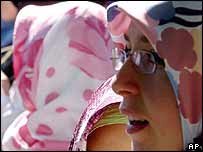
Europe is a land of conflict grounded in religious difference.
August Prize winner, Sweden’s Per Olov Enquist notes that “half of Europe’s wars, from the Monophystic struggles in the Roman Empire… to the German Empires’ cultural battles in the 19th Century, had arisen from some sort of theological strife, and since the church was a state institution, it led to war.”
The so-called “cultural differences” influencing anti-Constitution referenda have their roots in long histories of religious wars. Not only have they never been solved, they’ve never been addressed. In 1648 they began to be ignored.
This effort to ignore religion results in dominant European powers stumbling in the darkness, and tripping flat-footed over matters of religion. France, a massive player in EU politics was deemed in violation of International Law in its discriminatory headscarf ban, and likewise Germany has had the dubious distinction of being declared a human rights violator by numerous human rights watchdogs and organizations — most notably including the U.S. State Department, the United Nations Human Rights Committee, the Rutherford Institute, Human Rights Watch/Helsinki and the Organization for Security and Cooperation in Europe.
In Catholic Europe's largest dioceses in Germany, France, Italy, and Ireland, the percentage of Catholics who attend Mass regularly has slipped to as low as 20 percent, and in a few cities, like Paris, has reached as low as the single digits, according to figures compiled by the church. Yet pope John Paul II and the Vatican pressed for an explicit recognition of Christianity in the European constitution. Although that effort ultimately failed, the Pope stayed resolute on the importance of the continent's Christian patrimony. "Whether or not it is recognized in the official documents," he said, "it is an undeniable fact, which no historian can overlook." Yet 15 million Muslims live in Europe, up to 3 times the number of Muslims living in America. 10 million Muslims live in France and Germany alone, and Muslim Turkey remains in its 4th decade of seeking European status.
An EU is a wonderful idea. It should happen. Success in that effort would help the whole world. Unfortunately this cannot happen so long as it is pursued on the patently unworkable notion that a union of any sort can be built on purely economic and political designs.
One downside of trying to cobble political and economic unions together while remaining blind to the spiritual and religious aspects of “cultural” rootedness is that you end up with 60,000 word, 265 page constitutions. The United States constitution based as it is on a declaration of self-evident truths, that all men are created equal, … endowed by their Creator with certain unalienable Rights is one 12th the size.
In the United States the ideal of human equality is based on the assertion that we are created this way. Our rights are endowed by our creator. “Europe” on the other hand extracts rights and equality by drawing inspiration from the cultural, religious and humanist inheritance of Europe. Of the 25 “plenipotentiaries” affirming that human equality arises from Europe’s inheritance, almost a third sign as his or her majesty or royal highness.
As Enquist notes, Europe has hosted and exported religious conflict from its earliest days, but worse for its well-being is its recent 400 year experiment of hoping that religion if ignored will go away.
Religious fighting decimated and exhausted Europe in the 17th Century. It tired people of religion, but left state churches in place. Religious tiredness and state churches continue in Europe today, but the ascendant reign of the contra-religious intelligentsia never served to heal the ancient strife. Why? It is because healing division is itself a spiritual and religious act. That is the job of God and religion, to make things “one.”
The United States has yet to realize perfectly its ideals of universal rights and human equality, but it remains a union of the most far ranging diversity in history. It is a union that begins with the plain and unabashed acknowledgment that equality and rights are endowed by a creator, not inspired by fractious threads of philosophical and ideological inheritance.
All progressive and clear-thinking people should long to see a European Union. But, so long as the spiritual mission of “making things one,” is misconceived as purely political and economic, and so long as religious hostilities and prejudices remain enshrined in the hearts of people, prospects remain near hopeless.
Enlightened religious leaders are needed to light the way out of this history. But how dark is their path in modern-day Europe?
Dr. Frank Kaufmann
Director
Offcie of Interreligious Relations
IIFWP
These are the opinions of the author, not the positions of the IIFWP